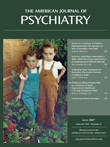Childhood Sibling Relationships as a Predictor of Major Depression in Adulthood: A 30-Year Prospective Study
Abstract
Objective: The authors examined the quality of sibling relationships in childhood as a predictor of major depression in adulthood. Method: Study subjects were 229 men selected for mental and physical health and followed from ages 20 through 50 and beyond as part of a study of adult psychosocial development. Data were obtained from interviews with participants and their parents at intake and from follow-up interviews and self-report questionnaires completed by participants at regular intervals. These data were used to rate the quality of relationships with siblings, the quality of parenting received in childhood, and family history of depression as well as the occurrence, by age 50, of major depression, alcoholism, and use of mood-altering drugs (tranquilizers, sleeping pills, and stimulants). Results: Poorer relationships with siblings prior to age 20 and a family history of depression independently predicted both the occurrence of major depression and the frequency of use of mood-altering drugs by age 50, even after adjustment for the quality of childhood relationships with parents. Poor relationships with parents in childhood did not predict the occurrence of depression by age 50 when family history of depression and the quality of relationships with siblings were taken into account. Quality of sibling relationships and family history of depression did not predict later alcohol abuse or dependence. Conclusions: Poor sibling relationships in childhood may be an important and specific predictor of major depression in adulthood. Further study of links between childhood sibling relationships and adult depression is warranted.



